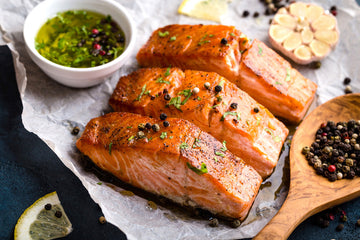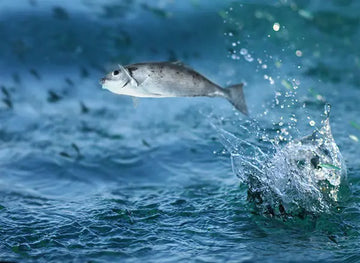As parents, we all want the best for our children, especially when it comes to their health and development. One essential element in a child's diet that often doesn't get enough attention is protein, particularly from safe residue-free fish. Let's dive into why this is so crucial and how it can significantly boost your child's growth and overall well-being.
Why Protein?
Protein is a fundamental building block for the human body. It plays a pivotal role in the growth and repair of tissues, the production of enzymes and hormones, and the overall maintenance of good health. For children, who are in their prime years of development, an adequate protein intake is vital for several reasons:
Muscle Development: Protein helps in the development and strengthening of muscles, which is essential for children as they grow and become more active.
Bone Health: Alongside calcium, protein is crucial for bone growth and strength. This is particularly important during the early years when the foundation for lifelong bone health is established.
Immune Support: Protein aids in the production of antibodies, which are necessary for a robust immune system. This means fewer sick days and more active, healthy playtime.
Brain Development: Protein-rich foods support cognitive function and brain development, contributing to better focus and learning capabilities in school.
Why Fish?
Fish stands out as an excellent source of protein for several reasons:
High-Quality Protein: Fish provides all the essential amino acids that our bodies need, making it a complete protein source.
Omega-3 Fatty Acids: In addition to protein, fish is rich in omega-3 fatty acids, particularly DHA, which is crucial for brain development and vision in children.
Vitamins and Minerals: Fish is also packed with essential vitamins and minerals such as Vitamin D, B2 (riboflavin), calcium, phosphorus, iron, zinc, iodine, magnesium, and potassium.
Safe Residue-Free Fish
However, the key is to ensure that the fish your children consume is safe and residue-free. Here's why:
Reduced Risk of Contaminants: Fish can sometimes be contaminated with harmful chemicals and heavy metals like mercury. Consuming safe, residue-free fish ensures that these contaminants are not part of your child's diet.
Natural and Wholesome: Residue-free fish are often sourced from environments where they are raised or caught naturally, without the use of harmful chemicals or antibiotics, ensuring a more wholesome food source.
Better Nutritional Value: Fish raised or caught in clean, natural environments tend to have a better nutritional profile, providing more of the good stuff – proteins, omega-3s, and vitamins – and less of the bad.
Conclusion
Incorporating safe residue-free fish into your child's diet is a step towards ensuring they receive the high-quality protein and essential nutrients needed for their optimal growth and development. It's a win-win: supporting their physical and cognitive development while promoting a healthy immune system and strong bones.
So next time you're planning meals, consider adding some safe, residue-free fish. Your child's health and future self will thank you for it!
Bibliography
World Health Organization. "Protein and Amino Acid Requirements in Human Nutrition." WHO Technical Report Series, no. 935, World Health Organization, 2007.
- National Institutes of Health. "Omega-3 Fatty Acids and Health." NIH Office of Dietary Supplements, 2021.
- Harvard T.H. Chan School of Public Health. "The Nutrition Source: Protein."
- U.S. Department of Agriculture. "Seafood: Health Benefits & Risks."
- Food and Agriculture Organization of the United Nations. "The State of World Fisheries and Aquaculture 2020."
- American Academy of Pediatrics. "Fish: Healthy Diet Choices for Children."





